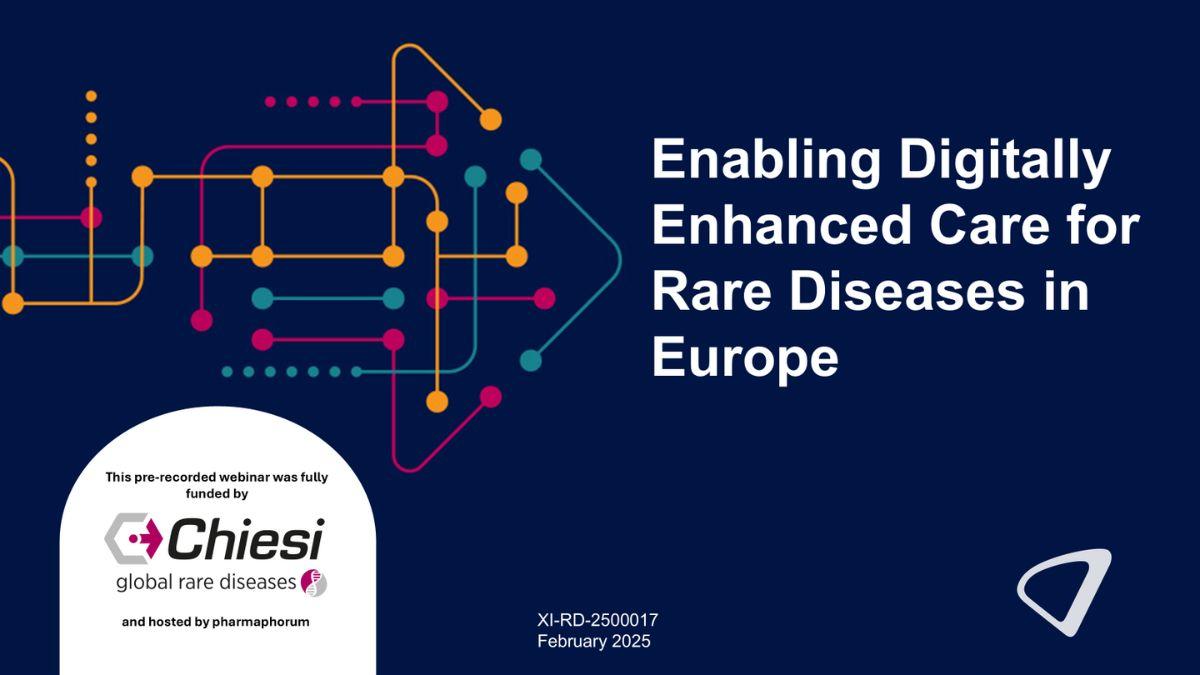Enabling Digitally Enhanced Care for Rare Diseases in Europe


This pre-recorded webinar was fully funded by Chiesi GRD and hosted by pharmaphorum. Professor Maurizio Scarpa received an honorarium for his participation and contribution to this webinar. The speakers, Professor Alberta Spreafico and Alessandra Vignoli are full-time employees of EVERSANA and Chiesi GRD, respectively.
In this webinar, experts discuss a pioneering initiative led by Professor Maurizio Scarpa, serving as the clinical and scientific chairman, and Professor Alberta Spreafico, who brings her academic and practical expertise in systemic health innovation and policy to the conversation.
In collaboration with a diverse group of expert healthcare professionals and patient associations, the project explores the integration of digital health innovations ranging from AI to telemedicine, digital medical devices, and other connected care technologies into care pathways for Lysosomal Storage Disorders (LSDs) across Europe.
The initiative aims to evaluate the appropriateness and impact of these innovations to enhance care. Lysosomal Storage Disorders present significant challenges, including delayed diagnoses, fragmented care pathways, and limited access to specialist care. Digital health technologies (DHTs) offer a transformative opportunity to address unmet needs by enabling earlier intervention, enhancing care coordination, and empowering patients and healthcare providers with innovative tools.
Register now here to watch this pre-recorded webinar that provides insights into this transformative approach and hear directly from the experts driving the initiative forward.
The initiative highlights the need for continued generation of high-quality clinical evidence, assessment of health economic impacts, multi-stakeholder engagement, policy innovation, and awareness and education.
As health policies evolve to envision the integration of DHTs into healthcare systems, it is essential to assess their appropriateness and potential to optimise care pathways, clinical outcomes, and provide systemic value.
In this webinar, discover:
- Who is guiding the project
- Why this project is being undertaken
- The main objective(s) of the project
- How the project was/is conducted
- The outputs up to now
- Limitations that have yet to be addressed
About the panellists
 Professor Alberta Spreafico is a recognised Digital Health and Health Policy expert, serving as Senior Vice President of Health Innovation at EVERSANA, Adjunct Professor at the University of Pavia, and Academic Fellow at SDA Bocconi, where she focuses specifically on Health Policy and Innovation Research and Education. She is a global health innovation pioneer, health policy expert, and established digital health strategist, thought leader, and lecturer with 10+ years of experience. Spreafico co-founded health innovation development programmes worldwide, systematically integrating innovations to enhance care quality and equity. She contributed to NASA's Benefits for Humanity programmes, leveraging innovations to address global health challenges, and participated in multiple United Nations expert meetings and intergovernmental programmes. Moreover, she serves as the Director of the Digital Health Policy Summit at Frontiers Health, as a Policy Knowledge Partner for the Digital Therapeutics Alliance, and as an External Advisory Board Member of the European Health Data Space “HealthData@EU”.
Professor Alberta Spreafico is a recognised Digital Health and Health Policy expert, serving as Senior Vice President of Health Innovation at EVERSANA, Adjunct Professor at the University of Pavia, and Academic Fellow at SDA Bocconi, where she focuses specifically on Health Policy and Innovation Research and Education. She is a global health innovation pioneer, health policy expert, and established digital health strategist, thought leader, and lecturer with 10+ years of experience. Spreafico co-founded health innovation development programmes worldwide, systematically integrating innovations to enhance care quality and equity. She contributed to NASA's Benefits for Humanity programmes, leveraging innovations to address global health challenges, and participated in multiple United Nations expert meetings and intergovernmental programmes. Moreover, she serves as the Director of the Digital Health Policy Summit at Frontiers Health, as a Policy Knowledge Partner for the Digital Therapeutics Alliance, and as an External Advisory Board Member of the European Health Data Space “HealthData@EU”.
 Professor Maurizio Scarpa is the Coordinator of metabERN and directs the Regional Coordinator Centre for Rare Diseases at the University Hospital of Udine in Italy. Prof Scarpa earned his medical degree and doctorate, completing his residency in Pediatrics at the University of Padova. He pursued postdoctoral fellowships in molecular biology at the European Molecular Biology Laboratory and in genetics at Baylor College of Medicine. As the Director of the PhD Course on Genetics and Biochemistry at the University of Padova, he also held roles in international affairs. With expertise in genetics, biotechnology, and paediatric rare disorders, he collaborates with biotech companies and coordinates European projects like INNERMED and MetabERN. He aims to develop a European MD/PhD programme on Inherited Metabolic Diseases and has published around 140 scientific works.
Professor Maurizio Scarpa is the Coordinator of metabERN and directs the Regional Coordinator Centre for Rare Diseases at the University Hospital of Udine in Italy. Prof Scarpa earned his medical degree and doctorate, completing his residency in Pediatrics at the University of Padova. He pursued postdoctoral fellowships in molecular biology at the European Molecular Biology Laboratory and in genetics at Baylor College of Medicine. As the Director of the PhD Course on Genetics and Biochemistry at the University of Padova, he also held roles in international affairs. With expertise in genetics, biotechnology, and paediatric rare disorders, he collaborates with biotech companies and coordinates European projects like INNERMED and MetabERN. He aims to develop a European MD/PhD programme on Inherited Metabolic Diseases and has published around 140 scientific works.
 Alessandra Vignoli has been with Chiesi since 2020, serving as Vice President of Regional Portfolio Strategy AIM. With a career spanning two decades, Vignoli began her journey in the rare disease sector in 2004 at Genzyme, where she worked across diverse teams to drive business growth, successfully launch products, and deliver high-impact projects. Her expertise and commitment to the rare disease field continued at Sanofi starting in 2012, where she held the role of Rare Disease Director and led the Patient Support Program, further solidifying her legacy in rare diseases. Known for her passion and dynamic leadership, Vignoli brings deep insights into the specialty and rare disease markets. She is a multilingual professional with strong intercultural skills, having amassed extensive global experience that enhances her strategic vision and execution. Her dedication to patient-centric approaches and her commitment to advancing rare disease care make her an invaluable asset to Chiesi and the communities she serves.
Alessandra Vignoli has been with Chiesi since 2020, serving as Vice President of Regional Portfolio Strategy AIM. With a career spanning two decades, Vignoli began her journey in the rare disease sector in 2004 at Genzyme, where she worked across diverse teams to drive business growth, successfully launch products, and deliver high-impact projects. Her expertise and commitment to the rare disease field continued at Sanofi starting in 2012, where she held the role of Rare Disease Director and led the Patient Support Program, further solidifying her legacy in rare diseases. Known for her passion and dynamic leadership, Vignoli brings deep insights into the specialty and rare disease markets. She is a multilingual professional with strong intercultural skills, having amassed extensive global experience that enhances her strategic vision and execution. Her dedication to patient-centric approaches and her commitment to advancing rare disease care make her an invaluable asset to Chiesi and the communities she serves.
XI-RD-2500005
February 2025
* When you click to register for this webinar you will be taken to a website run by ON24 who host the webinar and gather your registration data.
This data will then be passed to pharmaphorum media limited, and in turn passed to the company(ies) we are partnering with to bring you the webinar. This data may be used by us and them for occasional marketing purposes. It will not be shared with any further third parties.
By clicking to register for this webinar you give consent for any data you provide to be used in this way.
If at any point you no longer wish to be contacted based on the information you provide during the registration for this webinar, please send an email to info@pharmaphorum.com requesting that your information is deleted in accordance with the General Data Protection Regulation.











